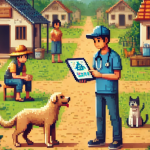
When Shelters Overflow: What NYC’s Crisis Tells Us About Pet Surrender—and What You Can Do
In July 2025, a gray-muzzled senior dog named Rocky quietly became a symbol of a growing crisis. As the 1,000th animal admitted to New York City’s Animal Care Centers (ACC), Rocky’s arrival marked a heartbreaking milestone: the shelters had hit capacity and stopped accepting animals—unless it was an emergency. This isn’t just a New York story. It’s a wake-up call for pet lovers across the country.
From Arizona to Virginia, animal shelters are at a breaking point. But this crisis isn’t just about numbers—it’s about people, pets, and the invisible struggles between them. Recent research by Dr. Lexis Huyanne Ly from the University of British Columbia sheds light on the real reasons pet owners give up their animals—and why blame isn’t the answer.
The Real Reasons Pets Are Being Surrendered
The most common explanation? Cost.
As living expenses soar, so do the costs of pet care. Since 2019, the price of veterinary services and grooming has jumped 42%, and food prices have climbed 22%. Families are choosing between rent and Rover, electricity or Whiskers. And when the bills can’t be paid, even beloved pets become part of the collateral damage.
But Dr. Ly’s research makes one thing clear: people aren’t giving up their pets because they don’t care. In fact, many are devastated. Her survey of more than 450 pet owners who had surrendered animals in the past five years showed that emotional distress, not indifference, was the norm. People described feeling “heartbroken,” “ashamed,” and “out of options.”
It’s Not Just One Reason: A Web of Hardship
Using data from shelters and self-rehoming platforms like Rehome, Ly found that surrender decisions rarely come down to a single factor. Instead, they’re driven by a combination of:
- Financial hardship: Job loss, eviction, medical bills.
- Behavioral issues: Pets with special needs or behavioral challenges that overwhelmed owners.
- Life transitions: Moving, divorce, death in the family, or entering assisted living.
- Lack of support: Many owners tried seeking help before surrendering, but couldn’t find it.
In short, pet surrender is often a last resort after other doors have closed.
Community Matters: Where You Live Affects Pet Outcomes
Dr. Ly also found a troubling pattern in shelter data: surrender rates were higher in neighborhoods with greater socioeconomic vulnerability, where access to affordable veterinary care, pet-friendly housing, and transportation is limited. These areas were more likely to lose pets, and less likely to adopt them back.
This aligns with what’s happening in New York City, where over 200 animals were still accepted post-closure because they were deemed public safety risks or sent by city agencies. These communities need more than guilt trips. They need resources.
Shelters Are Doing Their Part. Are We?
Shelters like NYC’s ACC are adapting by offering food pantries, low-cost vaccine clinics, and veterinary vouchers to help people keep their pets. Even a one-month supply of food can make the difference between a family staying together or being forced apart.
But shelters can’t solve this crisis alone.
As Dr. Ly writes, the solution lies in what she calls “community surrender pathways.” That means giving pet owners options—self-rehoming platforms, emergency boarding, behavior support, and public education—before they ever walk through a shelter’s door.
What You Can Do—Today
Whether you’re a pet parent or just someone who cares about animal welfare, here’s how you can help:
🐾 Foster a Pet
Even short-term fosters free up space and save lives. Reach out to your local shelter or rescue to learn more.
💸 Donate or Sponsor Supplies
Financial contributions, pet food, and supplies like crates and toys are always needed—and they directly help keep animals out of shelters.
📣 Amplify the Message
Share adoptable pets on social media, tell your friends about fostering, or volunteer your time and skills to support your local shelter’s mission.
🐶 Adopt—If You Can
Opening your home to a new family member, especially seniors like Rocky, can change both your lives forever.
No One Wants to Say Goodbye
As ACC President Risa Weinstock said, “People who bring their animals [to the shelter] are out of options. They’re not out of compassion.”
Dr. Ly’s research backs that up, emphasizing empathy, not judgment. Behind every surrender is a story. Often, it’s a parent trying to protect their child’s only source of comfort, or a senior who can’t afford the rising costs of care. And yes, sometimes it’s someone who just didn’t know where else to turn.
Our job as a community? Make sure they do.
Want to learn more about how to keep pets and families together?
Subscribe to our newsletter for science-backed tips, heartwarming stories, and ways to support animal welfare in your community.




